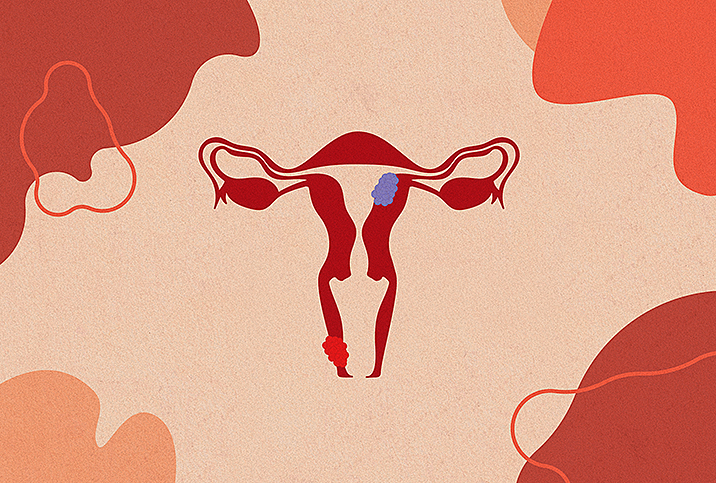Navigating Reentry Into Sex After Uterine Cancer

It feels like all health conditions love to interfere with our sexuality. They strip away energy and complicate the relationship with our bodies as medical interventions pile up.
Wrestling with the impact of a condition that wages war on our reproductive system adds another layer of difficulty to reengaging with sex after treatment.
Uterine cancer is a prime example of this scenario. One of the most common gynecological cancers, uterine cancer affects about 3 percent of women, according to the National Cancer Institute.
What is uterine cancer?
"Uterine cancer is a type of cancer that begins in the uterus," said Amir Marashi, M.D., an OB-GYN with Brooklyn Gynecology Place in Brooklyn Heights, New York. "There are two types of uterine cancer: endometrial cancer and uterine sarcoma."
Endometrial cancer develops in the endometrium, which is the inner lining of the uterus. It is one of the most common gynecological cancers, the branch of cancers that affects the female reproductive system.
Uterine sarcoma develops in the myometrium—the muscle wall of the uterus—but occurs rarely, accounting for 5 percent or less of all uterine cancers.
The term "uterine cancer" is colloquially used to refer to either endometrial cancer, uterine sarcoma or other rarer forms of cancer that occur in the uterus. However, because endometrial is the most common type that forms in the uterus, the terms "uterine cancer" and "endometrial cancer" are often used interchangeably.
The American Cancer Society (ACS) estimates that about 66,200 new cases of uterine cancer will be diagnosed in 2023, and about 13,000 people will die from the disease.
"Uterine sarcoma is usually detected with an imaging study: ultrasound, CT scan or MRI," Marashi said. "The diagnosis is confirmed with a biopsy. Endometrial cancer is diagnosed with endometrial biopsy or dilation and curettage. Although a Pap test is designed to detect cervical cancer, sometimes it can detect uterine cancer cells."
Endometrial cancer mostly affects postmenopausal women and is uncommon in women younger than 45. The average age at time of diagnosis of endometrial cancer is 60.
Uterine cancer is more common among Black women, and they are more likely to die as a result of it, according to the ACS.
Due to the presence of abnormal vaginal bleeding as an early symptom, uterine adenocarcinomas are diagnosed at an early stage in an estimated 66 percent of cases.
"Treatment of uterine cancer depends on the location and stage," Marashi said. "Surgery to remove the uterus, a hysterectomy, and sometimes ovaries and fallopian tubes, a salpingo-oophorectomy, is often performed. Advanced cases may need chemotherapy or radiation."
How does uterine cancer impact sexual function?
"Removing both ovaries will lead to the onset of menopausal symptoms such as hot flashes, night sweats and vaginal dryness, due to low estrogen," Marashi said. "Low estrogen levels can cause clitoral atrophy, low libido, decreased lubrication, decreased pleasure and less chance of orgasm."
Unfortunately, the proximity of uterine cancer to other sexual organs means its presence can devastate sexual function. Dysfunction may appear in the form of physical symptoms due to procedures that remove reproductive organs, or the associated treatments can trigger it.
"Radiation therapy may cause changes to the vaginal mucosa and cause the tissue to be fragile," said Amy Pilotte, A.N.P.-B.C., M.S.N., a nurse practitioner at Brown Surgical Associates in Newport, Rhode Island. "Vaginal stenosis, the narrowing of the vaginal canal, can be a long-term side effect of some of these treatments."
The effects of chemotherapy and radiation therapy cause chronic fatigue, which may lower libido or make it difficult to engage the sexual response area of the brain.
Resuming your sex life
Many cancer patients experience long-term sexual dysfunction. Fewer than 20 percent seek help from a medical professional, according to research reported in the European Journal of Cancer Supplements.
"All parts of treatment can impact sexual activity," Pilotte said. "Be sure to review with your surgeon and medical oncologist regarding sexual activity. Typically, after surgery there is a waiting period of healing before a patient is cleared for penetration. Patients will usually have an exam with their surgeon during a postoperative visit."
Once the medical team has signed off, you are free to reengage with your sexuality at a pace that suits you.
If you have any lingering symptoms, including soreness, that feel like a blockade, be open with your physicians about it. There might be an underlying physical problem that needs addressing, or you may just need some additional reassurance.
"Ask questions to your team sooner than later," Pilotte said. "Addressing sexual health concerns is important and complex. If your team is not able to help you, perhaps they can refer you to a local gynecologist with experience in this area. Or is there a local survivorship clinic with a sexual health expert? Some larger academic centers with survivorship clinics may do telehealth consultations, too."
Your medical team can also recommend rehabilitative options, including pelvic floor therapy, to help rebuild your sexual function.
Addressing the physical symptoms
The first step in addressing any physical symptoms in the bedroom is opening your mouth and using your tongue—but not in the way you might be thinking. Speak up and share your thoughts and feelings.
A partner cannot assist in rejuvenating your sex life without being empowered with knowledge about the situation. Do not hide pieces of the story that feel unpalatable or awkward; get it all out in the open, sooner rather than later.
Identify the problem areas that may need addressing, such as lubrication, changing sex positions and pain. Then work through them one by one. Start by introducing plenty of lubricant into the bedroom, making a sensory game out of it by trying different flavors and consistencies.
If you are struggling with penetration, vaginal dilators can help ease you back into it. Engaging with Kegel exercises can also help revive your pelvic floor health.
Ultimately, the most important part of reigniting your sexuality is remembering that there is no rush to copy and paste your old sex life into your new one. Life just isn't that easy. It is going to take time, patience and a lot of self-discovery to get back to a healthy place.


















